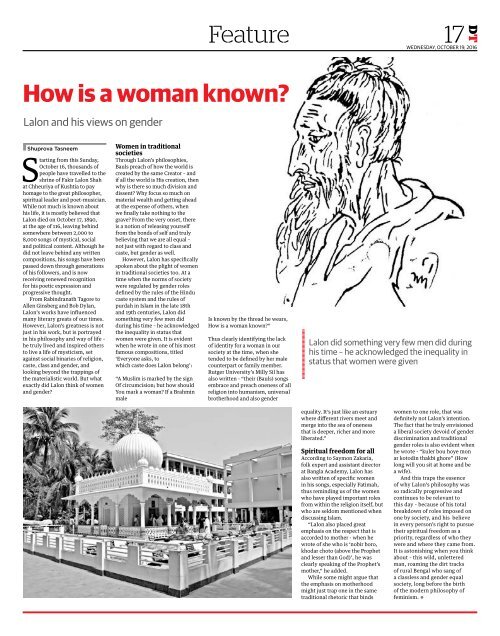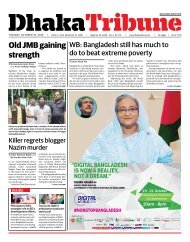ePaper_2nd Edition_October 19, 2016
You also want an ePaper? Increase the reach of your titles
YUMPU automatically turns print PDFs into web optimized ePapers that Google loves.
Feature<br />
17<br />
WEDNESDAY, OCTOBER <strong>19</strong>, <strong>2016</strong><br />
DT<br />
How is a woman known?<br />
Lalon and his views on gender<br />
• Shuprova Tasneem<br />
Starting from this Sunday,<br />
<strong>October</strong> 16, thousands of<br />
people have travelled to the<br />
shrine of Fakir Lalon Shah<br />
at Chheuriya of Kushtia to pay<br />
homage to the great philosopher,<br />
spiritual leader and poet-musician.<br />
While not much is known about<br />
his life, it is mostly believed that<br />
Lalon died on <strong>October</strong> 17, 1890,<br />
at the age of 116, leaving behind<br />
somewhere between 2,000 to<br />
8,000 songs of mystical, social<br />
and political content. Although he<br />
did not leave behind any written<br />
compositions, his songs have been<br />
passed down through generations<br />
of his followers, and is now<br />
receiving renewed recognition<br />
for his poetic expression and<br />
progressive thought.<br />
From Rabindranath Tagore to<br />
Allen Ginsberg and Bob Dylan,<br />
Lalon’s works have influenced<br />
many literary greats of our times.<br />
However, Lalon’s greatness is not<br />
just in his work, but is portrayed<br />
in his philosophy and way of life –<br />
he truly lived and inspired others<br />
to live a life of mysticism, set<br />
against social binaries of religion,<br />
caste, class and gender, and<br />
looking beyond the trappings of<br />
the materialistic world. But what<br />
exactly did Lalon think of women<br />
and gender?<br />
Women in traditional<br />
societies<br />
Through Lalon’s philosophies,<br />
Bauls preach of how the world is<br />
created by the same Creator – and<br />
if all the world is His creation, then<br />
why is there so much division and<br />
dissent? Why focus so much on<br />
material wealth and getting ahead<br />
at the expense of others, when<br />
we finally take nothing to the<br />
grave? From the very onset, there<br />
is a notion of releasing yourself<br />
from the bonds of self and truly<br />
believing that we are all equal –<br />
not just with regard to class and<br />
caste, but gender as well.<br />
However, Lalon has specifically<br />
spoken about the plight of women<br />
in traditional societies too. At a<br />
time when the norms of society<br />
were regulated by gender roles<br />
defined by the rules of the Hindu<br />
caste system and the rules of<br />
purdah in Islam in the late 18th<br />
and <strong>19</strong>th centuries, Lalon did<br />
something very few men did<br />
during his time – he acknowledged<br />
the inequality in status that<br />
women were given. It is evident<br />
when he wrote in one of his most<br />
famous compositions, titled<br />
‘Everyone asks, to<br />
which caste does Lalon belong’:<br />
“A Muslim is marked by the sign<br />
Of circumcision; but how should<br />
You mark a woman? If a Brahmin<br />
male<br />
Is known by the thread he wears,<br />
How is a woman known?”<br />
Thus clearly identifying the lack<br />
of identity for a woman in our<br />
society at the time, when she<br />
tended to be defined by her male<br />
counterpart or family member.<br />
Rutger University’s Milly Sil has<br />
also written - “their (Bauls) songs<br />
embrace and preach oneness of all<br />
religion into humanism, universal<br />
brotherhood and also gender<br />
Lalon did something very few men did during<br />
his time – he acknowledged the inequality in<br />
status that women were given<br />
equality. It’s just like an estuary<br />
where different rivers meet and<br />
merge into the sea of oneness<br />
that is deeper, richer and more<br />
liberated.”<br />
Spiritual freedom for all<br />
According to Saymon Zakaria,<br />
folk expert and assistant director<br />
at Bangla Academy, Lalon has<br />
also written of specific women<br />
in his songs, especially Fatimah,<br />
thus reminding us of the women<br />
who have played important roles<br />
from within the religion itself, but<br />
who are seldom mentioned when<br />
discussing Islam.<br />
“Lalon also placed great<br />
emphasis on the respect that is<br />
accorded to mother - when he<br />
wrote of she who is ‘nobir boro,<br />
khodar choto (above the Prophet<br />
and lesser than God)’, he was<br />
clearly speaking of the Prophet’s<br />
mother,” he added.<br />
While some might argue that<br />
the emphasis on motherhood<br />
might just trap one in the same<br />
traditional rhetoric that binds<br />
women to one role, that was<br />
definitely not Lalon’s intention.<br />
The fact that he truly envisioned<br />
a liberal society devoid of gender<br />
discrimination and traditional<br />
gender roles is also evident when<br />
he wrote - “kuler bou hoye mon<br />
ar kotodin thakbi ghore” (How<br />
long will you sit at home and be<br />
a wife).<br />
And this traps the essence<br />
of why Lalon’s philosophy was<br />
so radically progressive and<br />
continues to be relevant to<br />
this day – because of his total<br />
breakdown of roles imposed on<br />
one by society, and his believe<br />
in every person’s right to pursue<br />
their spiritual freedom as a<br />
priority, regardless of who they<br />
were and where they came from.<br />
It is astonishing when you think<br />
about – this wild, unlettered<br />
man, roaming the dirt tracks<br />
of rural Bengal who sang of<br />
a classless and gender equal<br />
society, long before the birth<br />
of the modern philosophy of<br />
feminism. •













